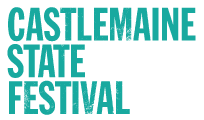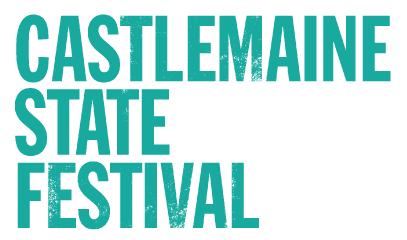Welcome to the first in a series of interviews with artists who are taking part in the Castlemaine State Festival’s Open Studios program.
What drew you to the medium that you work in?

Rachael: I trained as a visual artist originally, but found myself working in theatre as a singer and performer for two decades. Over time I became curious about the potential of my sculpture to be an element in theatre, so sculpture and performing converged as puppetry – it seemed a natural evolution. Being naturally inclined to the uncanny and the melancholy, puppetry is a very satisfying medium, deeply metaphorical and emotionally provocative.
Andy: I have a genetic condition called Marfan Syndrome, which has made me physically different, disabled, extraordinary (words are always not-quite-right). One of the main reasons I began writing poems, and reading them live, was in order to have more control over what my body might mean to others. I realise now that poetry is also about the spaces between us, the diversity of our lives, and that poems can turn the apparent failure of language into something strangely beautiful and transformative.
Where did you grow up? How did it shape you into becoming an artist
Rachael: I grew up in Tasmania; I also spent part of my childhood on Cape Barren Island, one of the Furneaux Group in the Bass Straight. These places were marginal and haunting – civilisation felt precarious and the dark wilderness was never far away. I had a very unusual upbringing and spent a lot of time in the natural world. These formative experiences and my parent’s interest in the arts definitely pushed me towards a life of creativity.
Andy: I was born in Bendigo, where I spent a lot of time exploring abandoned lots with friends, following the trails of invented stories and characters. I also spent a lot of time daydreaming, gathering internal resources for the years ahead, I guess. I moved to Melbourne when I was 17, which was much more culturally diverse – it was invigorating, and broadened my horizons hugely. I think I’m shaped by this tension between stillness and stimulation, solitude and the wider world.
What part of the making process do you enjoy most?
Rachael: The thrilling part for me is the point of surrender between what you’ve imagined and what the material properties of what you’ve created actually offer. I’ve always felt that my puppets/sculptures make themselves to some extent; they are always a surprise and demand reappraisal of the original idea. It’s a collaboration between object and maker, a constant process of discovery and letting go. Bringing others into the project is always exciting too – again the concept enlarges in unforseen and dynamic ways.
Andy: I really love it when those rare poems come out with seemingly little need for editing. They’re often the best ones. Mostly, of course, poems take a lot of work – research, grappling, changes of heart, tinkering with punctuation and layout. But then there is a moment when a poem seems to declare itself finished. If I’m lucky, I can hear a little click, the last element falling into place.
Did you choose your art subject or did it choose you?
Rachael: A bit of both. I began a creative journey in visual art and theatre and as these practices have converged and evolved, new possibilities keep demanding to be explored.
Andy: Poetry chose me (particularly poetry that touches on bodily difference), then I chose it back. And the cycle continues. It feels like an intuitive compulsion to write, and then to share it with others, to be part of a broader community, send some little ripples out.
Do you have one piece of work that you’ve created that stays with you, why?
Rachael: My first solo puppet show, ‘Hutch’ was a dark piece about a woman mothering a giant rabbit in a strange underground nursery. It was staged at Carmen’s tunnel in 2012. It was a deeply personal story and my first foray into self-devised work. In making ‘Hutch’ I became aware of the disquieting power of puppets to ‘say the unsayable’. The medium enabled me to go into forbidden and difficult psychological and emotional territory in a non-literal way. There was tremendous pain and liberation in doing that show.
Andy: There have been a few milestones so far, but the biggest is just around the corner. My next book will be “Music our bodies can’t hold”, a collection of portrait poems of other people with Marfan Syndrome, both famous and not. For me, it feels like the most direct and engaging thing I’ve done, but also the most experimental. It’s deeply personal, but not about me, a gift to my genetic family.
What does the Castlemaine State Festival mean to you?
Rachael: Having only lived in Castlemaine for one year, I am very excited to be part of the festival – it is a way of introducing our work to this community, making a creative offering and being part of something that is integral to Castlemaine’s unique and amazing identity.
Andy: Castlemaine State Festival is that rare breed of festival, the best kind – both intimate and wide-ranging. I’m looking forward to seeing work I wouldn’t normally get a chance to see. And it’s an honour to be a part of it.
You can view Andy’s work at his website here


![Ben-laycock-castlemaine-artist-337x265[1]](/2017/wp-content/uploads/2017/03/Ben-laycock-castlemaine-artist-337x2651-50x50.jpg)
![raven01[1]](/2017/wp-content/uploads/2017/03/raven011-50x50.jpg)
![pjpa_m109214[1]](/2017/wp-content/uploads/2017/03/pjpa_m1092141-50x50.jpg)





